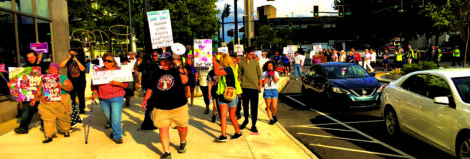Feds scold city of Youngstown over wastewater project delays
YOUNGSTOWN — The U.S. Department of Justice is displeased with Youngstown’s efforts to modify mandated improvements to its wastewater system and halted discussions Feb. 14 on the issue, according to emails between the two sides.
“This letter notifies Youngstown that the United States does not intend to propose or agree to further extensions of this informal negotiations period” past Feb. 14, according to a Feb. 9 email from Pedro Segura, a trial attorney in the DOJ’s environmental enforcement division, to Terrence S. Finn, a lawyer with the Roetzel & Andress law firm that is representing Youngstown.
The Vindicator made a public records request Jan. 30 to Youngstown for any correspondence between federal authorities and the city and / or Roetzel & Andress since Oct. 2 regarding the wastewater dispute. After repeated follow-up requests, the city turned over three letters to the newspaper nearly two months later.
In the Feb. 9 email, Segura outlined the history of Youngstown’s issues following a federal consent decree to make improvements to its wastewater facilities.
He wrote: “Youngstown first began defaulting on its long-term control plan deadlines for the wastewater treatment plant improvements and Mill Creek project beginning in early 2020. Over a year later, Youngstown requested that EPA modify the LTCP to give Youngstown another two years to update its hydraulic model, assess its finances and propose alternatives to the Mill Creek and wet weather facility projects. Since then, the United States has tried in good faith to negotiate a modification of the consent decree to address the parties’ mutual concerns fairly and reasonably.”
Segura added: “Perceiving a lack of progress in those discussions and in light of continued unacceptable discharges of untreated sewage to the receiving waters, the United States notified Youngstown that it would explore other enforcement options.”
The DOJ, Segura wrote, “engaged in further good-faith negotiations with Youngstown during information dispute resolution, but once again perceives a lack of progress in negotiations.”
Segura required Youngstown to complete its combined sewer overflow projects required by the existing plan dates, meet all overdue and approaching pre-2025 plan schedule milestones as soon as possible, meet all post-2024 plan milestones on an accelerated basis and pay a $1,479,000 penalty.
An “informal negotiations period” between the two sides was triggered by an Oct. 2 letter by Jeff Limbian, then the city’s law director, to the state and federal environmental protection agencies.
That came after a Sept. 29 letter from Segura demanded half of a $1,479,000 penalty from Youngstown because the city “defaulted” on following through with federally-mandated wastewater improvements for more than two years.
Half of the penalties – $739,500 – was to be paid to the federal EPA with the Ohio EPA allowed to make demand for the other half as per the city’s federal consent decree to make the wastewater improvements, Segura wrote in that letter.
“The United States and the state reserve their rights to assess and collect further penalties and pursue added remedies for these violations,” Segura wrote Sept. 29. “To be clear, the United States believes that Youngstown has continued to violate the 2002 consent decree since June 30, 2021, and the United States reserves the right to assess further stipulated penalties that have accrued since then.”
After failing to convince the federal government to modify the improvements, Youngstown on March 15 asked Christopher A. Boyko, a senior judge for the U.S. Court’s Northern District of Ohio, to reduce the scope of the work.
It specifically asked for a reduction in a project to build a “wet weather facility” near its wastewater treatment plant to reduce combined sewer overflows.
In the court motion, Finn wrote the project in 2002 was initially estimated to cost $62 million, but is now at more than $240 million.
The city wants to do one or two smaller projects to better control sewage in heavier rainfalls with Finn writing that a new model shows the “number of overflow events and overflow volume” are “far less compared” with the original data.
The filing didn’t include a cost estimate, but Finn wrote that a storage basin to hold flow during storm events and then release it back into the system after the storm event is one option. The other is adding a less expensive treatment facility to the treatment plan to “provide the same level of control.”
The city is also doing two other projects, costing about $20 million, that will be finished by January 2025 and reduce sewer overflows.
The federal EPA originally had ordered the city in 2002 to do $310 million worth of work, but it was negotiated down to $160 million in 2014 with the expectation it would be finished in 20 years.
The city has tried to get that price down further, but federal authorities have rejected those requests.
The first phase was upgrades to the city’s wastewater treatment plant that have been completed.
The initial estimate was $37.3 million, but the city court filing said it cost Youngstown $70 million.
That work helped reduce the sewer overflows that would be part of the wet weather facility project, the city’s court filing states.
The wet weather facility was supposed to be phase two of the work and was required to start Feb. 7, 2022. The work hasn’t begun.
The city’s board of control on March 15 approved $4.8 million of design work on the third phase of the project: an interceptor sewer project to keep wastewater from 13 lines from flowing into Mill Creek Park.
Design work was supposed to start July 11, 2020, on that project, and construction was to begin this April 5.
The city missed the deadline but wrote in the court motion that it would have a compressed schedule and finish 15 months earlier than the initial time.
Also, that project was estimated to cost $47.7 million and will now cost $72.5 million, according to the court filing.
The city raised sewer rates by 259% since 2001 to pay for the wastewater upgrades as part of the consent decree, according to a statement included in the city’s filing from Charles Shasho, deputy director of public works. It will need to raise rates again to pay for the two other phases, according to Shasho.
In a Jan. 3 letter to the city, federal officials agreed to permit more time for the wet weather facility project with the city responding Jan. 26 that “the new dates proposed by the United States are not workable.”
Both letters are unsigned so it’s unclear who sent them.
Federal officials said if there is to be an alternative project, it would need EPA approval — which Youngstown agreed to obtain.
The federal letter also gave a list of criteria “to mitigate the environmental and public health harms caused by Youngstown’s noncompliance.”
In response, the city wrote: “There is no evidence of any such alleged harms.”
It added the city “has negotiated in good faith and Youngstown did not cause the delays in negotiations.”
The federal officials also required the city to clean and inspect annually 10% of its sewers so over a 10-year period it has cleaned all of them at least once. The city agreed.
Have an interesting story? Contact David Skolnick by email at dskolnick@vindy.com. Follow him on X, formerly Twitter, @dskolnick




